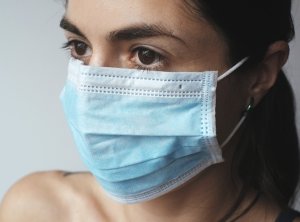 Due to the COVID-19 pandemic that broke out in March 2020, protective face masks have become the new normal. Unfortunately, wearing a face mask for hours isn’t particularly comfortable; moreover, it can lead to skin irritation and acne breakouts that are referred to as maskne. Are there any ways to prevent and treat skin irritation and acne caused by wearing a mask? Let’s figure it out together.
Due to the COVID-19 pandemic that broke out in March 2020, protective face masks have become the new normal. Unfortunately, wearing a face mask for hours isn’t particularly comfortable; moreover, it can lead to skin irritation and acne breakouts that are referred to as maskne. Are there any ways to prevent and treat skin irritation and acne caused by wearing a mask? Let’s figure it out together.
Wearing protective face masks or special respirators is crucial for restricting the spread of the novel coronavirus. However, while some people only need to wear a mask for a couple of hours a day, mainly when shopping or using public transport, others (for example, medical staff, policemen, bus and taxi drivers, retail employees, etc.) have to wear face masks for hours.
Of course, constant contact with a mask results in skin chafing. The skin gets red and itchy, loses moisture and becomes vulnerable to bacteria that cause inflammation and acne breakouts. In addition, the moisture from your breath gets trapped under the mask, creating the perfect environment for bacterial growth and exacerbating inflammation and breakouts.
Naturally, not wearing a face mask during a pandemic is not an option. However, you can try to minimize the effects of wearing a mask on your skin by following a few simple rules.
First and foremost, you need to wash your hands before putting on a face mask (or use hand sanitizer if soap and running water are unavailable). Keep in mind that you should change your mask every couple of hours; when you need to change your mask, wash your hands, take the mask off, wash your hands once more (since they’ve been in contact with a used mask) and put a fresh, clean mask on.
If you wear reusable masks (and we hope you do because healthcare professionals need disposable masks more), make sure that they are breathable. It is very important to find the right balance between a mask’s abilities to protect you, absorb moisture and let you breathe. Wash your masks with unscented, hypoallergenic detergent and iron them on both sides.
Don’t touch you face during and after wearing a face mask (unless you’ve just washed your hands with soap or used hand sanitizer). First, touching your face with dirty hands (especially your eyes, nose and mouth) helps to spread bacteria and viruses. Second, it increases the risk of skin irritation, inflammation and acne breakouts.
To prevent maskne, you should ditch makeup. When you wear foundation or powder under the mask, it mixes with sweat and skin oil, clogging pores and creating the perfect environment for pathogenic flora. If you absolutely need to wear makeup, use a light tinted moisturiser instead of a heavy foundation and focus on eye makeup.
If you choose and wear a protective mask or respirator correctly, the likelihood of skin irritation and maskne will be quite low. However, quite low doesn’t mean zero chance at all. One more thing you should do in order to prevent skin problems caused by wearing a mask is to review your skincare routine and change it if necessary. Here are a few tips for adapting your beauty routine to wearing a mask.
Cleanse Your Skin Regularly, but Don’t Use Aggressive Products
Keeping your skin clean is important for preventing bacterial growth and associated inflammation. However, harsh cleansers strip your skin of moisture and natural protection, leaving it more vulnerable to pathogenic microbes. So while you do need to wash your face regularly, you should use a gentle cleanser with non-aggressive surfactants.
Don’t Forget About Hydration
It is important to remember that all skin types need hydration, so you should moisturise even if you have oily and/or acne prone skin. Choose moisturiser depending on your skin’s types and needs: dry skin needs heavier moisturisers with oils, while oily skin needs lightweight, non-comedogenic moisturisers.
Opt for Products with Anti-Inflammatory Ingredients
If you have to wear a face mask for hours, invest in skincare products with anti-inflammatory and regenerating ingredients, such as niacinamide, peptides, enzymes, allantoin, panthenol, zinc oxide, certain plant extracts, etc. They will help to restore your skin’s natural barrier function, combat inflammation, and prevent acne.
Avoid Aggressive Exfoliation
Even if it seems that thorough exfoliation may improve the condition of your skin, you shouldn’t use face scrubs or high concentration chemical peels. Opt for mild, enzyme-based peels to minimise the chance of skin damage. Exfoliate once or twice a week if you have oily skin and every couple of weeks if you have dry skin. If your skin is damaged, don’t exfoliate until it heals.
Use Spot Treatments
If you already have maskne, use special spot treatments with a soothing and keratolytic effect to relieve inflammation and get rid of pimples. Common active ingredients in such products include zinc, benzoyl peroxide, sulphur, alpha and beta hydroxy acids, and urea.
